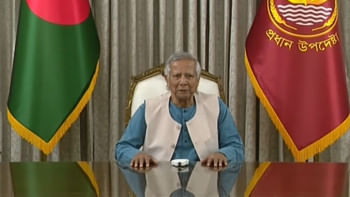Intriguing Statecraft and Enigmatic Politics

Looked at from a political perspective, Bangladesh will always seem to be a land of democratic upheavals and agitations that has characterized it since its birth. But looked at from an economic one, it will appear to be a country that has crossed immensely troublesome terrains and negotiated financial hurdles successfully. Indeed, Bangladesh has recently obtained the status of a middle income country. And yet, geopolitical analysts have repeatedly pointed their fingers at the lack of good governance in Bangladesh despite its progress in a number of sectors. Moreover, different international organizations have stated over and over again that the level of democracy in Bangladesh has not yet reached satisfactory heights. These are the thoughts that came to my mind while I was going through Akbar Ali Khan's book Abak Bangladesh: Bichitro Chholonajale Rajniti. My endeavors to translate the book's title into English have resulted in the following words: "Amazing Bangladesh: Where Politics is Entangled in Enigmatic Cobwebs." That is not exactly a verbatim translation. However, this English rendering gestures at the thematic streams of the book.
Khan has spotlighted well the political stumbling stones Bangladesh often confronts. In a scholarly manner, he endeavors to suggest remedies to these critical drawbacks from socio-economic angles. It needs to be said too that even though his book by Akbar Ali Khan refers to the country's complex economic and political woes, it has a piercingly humorous undertone throughout.
It is not the aim of Khan's book to convey answers to the country's political puzzles. Rather, it strives to make people aware of their rights and responsibilities a la democracy, development and political reforms. Akbar Ali Khan's language in this book is very suggestive and not at all abstruse, which is why this book should be able to attract readers from all backgrounds.
The sayings of eminent political figures have also made this book a substantial and penetrative work. While writing about the political intrigues encompassing Bangladesh, for example, Akbar Ali Khan recalls Winston Churchill's words: "A riddle wrapped in mystery inside an enigma". The words "riddle", "mystery" and "enigma" in this context refer to the intricacy and convoluted gridlocks that have transfixed political affairs in the country. However, the author has no desire to intimidate readers with such metaphors; he has, in fact, presented his analysis, arguments and interpretations in graspable ways so that readers can figure out the meanings of his deliberations without straining their imagination.
Another maxim applied equally powerful in this book by Khan is that of the French statesman Charles De Galle who had once declared: "Politics is too serious a matter to be left to the politicians". These words by Charles De Galle are indeed very thought-provoking. These words stress the fact that politicians should not be the only people in charge of a country's political activities. Rather, people from all walks of life have definite roles to play for the sake of the political stability of the nation.
Akbar Ali Khan has categorically asserted in this book that statecraft cannot he managed with just humbug and verbal rhetoric. Hard work, dedication, rationality, patriotism, far-sightedness and integrity are required to overcome political challenges. Akbar Ali Khan has also portrayed the vicissitudes Bangladesh had to go through after liberation. The drastic changes in Bangladesh's state mechanism during the 80s and 90s have been very keenly examined in this book. Bangladesh's progress in establishing secularism and a people-friendly civil service has been scrutinized too. The judicial service of Bangladesh and the bureaucratic complications which often slow down the pace of development both at personal and collective levels have been scrutinized as well.
Another vital point that Akbar Ali Khan addresses in this book is that of administrative decentralization. He has defined and classified decentralization in a lucid way by calling it "double devolution". It goes without saying that administrative decentralization is direly needed in Bangladesh to speed up the government's development programs and to bring about a smooth and hassle-free service-providing system for ordinary citizens. Khan has also called upon civil society members to play their roles objectively to ensure justice, equity and transparency all across the nation.
Khan has laid emphasis on initiating reforms in the governance of Bangladesh. In this context he has underscored the idea of reforming the Police Act to modernize the police force and to make the police department more efficient and useful for the ordinary citizens. The forces implementing the law and maintaining order are the ones essential to ensure justice and establish discipline in everyday life. For this reason Khan believes finds it is very important to bring about required changes in the way police departments in our country work.
It is obvious that Akbar Ali Khan had to do a lot of hard work to write this book of over four hundred pages. In his references he has acknowledged his debt to a wide range of books, essays and other sources wherefrom he gathered his facts and figures to establish his thesis in Abak Bangladesh: Bichitro Chholonajale Rajniti.
It can be noted by way of conclusion that Akbar Ali Khan was born in 1944. He has served the Bangladesh government as both its finance and cabinet secretary. He also held the post of an adviser in the caretaker government of 2007—2008. He had already authored a remarkable range of books on economics, history and governance. At present Khan teaches at BRAC University, Dhaka.
The author is a regular contributor in different English dailies.


 For all latest news, follow The Daily Star's Google News channel.
For all latest news, follow The Daily Star's Google News channel. 



Comments